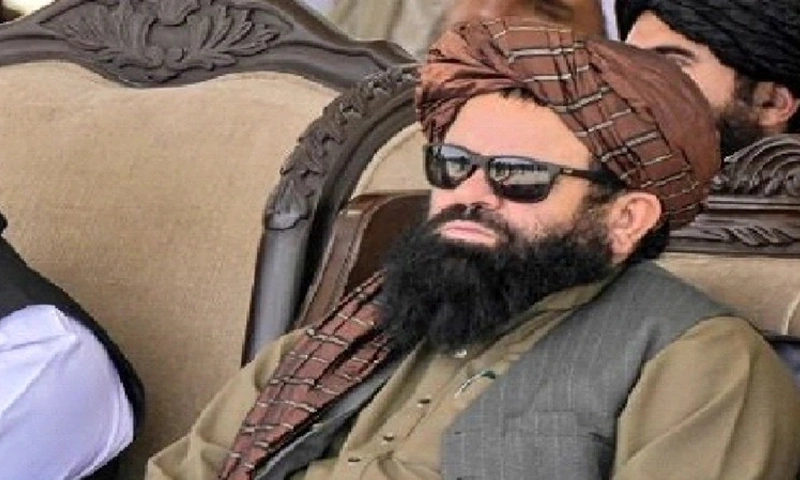- Web
- Feb 20, 2026
Afghan Taliban leader’s presence in India generates speculations
-

- Web Desk
- May 16, 2025

By Tahir Khan
ISLAMABAD: Afghanistan’s Deputy Interior Minister Ibrahim Sadr, one of the Taliban influential leaders, is in New Delhi amid the ongoing conflict between Pakistan and India, people aware of the visit confirmed to Hum News English on Friday.
Ibrahim arrived in India on May 3, less than two weeks after the Pahalgam attack and is still there, the Afghan sources said.
Afghan government spokesman Zabihullah Mujahid and Interior Ministry spokesman Abdul Mateen Qani did not answer to queries.
The Afghan sources, however, said the Taliban deputy minister is still in India and he is “getting medical treatment”.
Although the Afghan sources insist Sadr was in India for treatment, the visit has assumed importance and attracted media attention in view of the tensions between Pakistan and India.
Ibrahim, who belongs to Sangin district in Kandahar, once headed the Taliban powerful military commission during the Taliban war against the US-led NATO forces.
The visit comes amid the ongoing contacts between the Taliban rulers in Afghanistan and the government of Prime Minister Narendra Modi.
On May 15, the Indian External Affairs Minister Dr S Jaishankar said he had “good conversation” with Acting Afghan Foreign Minister Mawlawi Amir Khan Muttaqi and discussed “ways and means of taking cooperation forward.”
On its part, the Afghan Foreign Ministry said Muttaqi called India as “a key regional country with historical relation with Afghanistan”, and expressed hope for further strengthening relations.
This was the highest level of contact between India and the Taliban government since they took over Afghanistan in August 2021.
DOMESTIC CRITICISM
The growing Taliban and India relations are under fire from several Afghan personalities.
Bilal Sarwari, a senior Afghan journalist, who has gone into exile after the Taliban takeover in 2021, questioned the first ever contact Muttaqi-Jaishankar telephonic contact.
“Why now? If India’s outreach to Kabul hinges on tensions with Pakistan, [then] would this dialogue have occurred at all in a calmer climate? This reactive approach weakens India’s credibility as a consistent regional actor,” Sarwari wrote on X on Friday.
He recalled, “Over the past 40 years, India has repeatedly distanced itself from old allies in times of crisis, including the Republic of Afghanistan in 2021. This history undermines any claim of long-term strategic partnership.”
Former Afghan parliamentarian Fawzia Koofi also questioned the Indian external affairs minister on X after he posted details of his phone talk with Muttaqi.
“Is the way you carry your engagement with the Taliban in line with “India’s historic friendship with the people of Afghanistan? Geopolitics in Asia seems to have overtaken the shared values we once believed united us,” she asked Jaishankar.
A senior Afghan Taliban Foreign Ministry official Zakir Jalaly, while talking about Muttaqi-Jaishankar, said Muttaqi discussed expanding bilateral relations and cooperation with his Indian counterpart.
“The Islamic Emirate has adopted a balanced policy based on active engagement with all sides, learning from the history of the country’s foreign relations, taking into account current regional and international realities, and clearly defining Afghanistan’s national interests,” Jalaly said in a tweet on May 15.
Several X accounts, including Taliban supporters, hailed the growing relations with the Indian government.
NOT A CONCERN FOR PAKISTAN
Foreign Office Spokesperson Shafqat Ali Khan evaded comments on bilateral relations of other countries when asked about the secret visit of the Taliban deputy minister and the two foreign minister’s telephonic talk.
“Afghanistan is a sovereign, independent country. We do not comment on what kind of relations it wants to pursue with other countries. It is Afghanistan’s sovereign right,” Khan said at his weekly briefing.
“At the same time, we urge our Afghan friends that no matter what kind of relations they have with a third country, their territory should not be used against Pakistan. How many ministers visit from India to Afghanistan or from Afghanistan to India, this is a bilateral matter between Afghanistan and India, and we respect Afghanistan as a neighbour, and as a sovereign, independent state,” the spokesperson said.
BACKGROUND
Taliban officials established contacts with the Taliban political envoys in Qatar when they signed Doha Agreement in February 2020.
Russia’s Moscow Format Consultations also provided an opportunity for the Taliban to interact with Indian officials.
JP Singh, an India diplomat, is considered the main character behind New Delhi’s engagement with the Taliban. He met the Afghan acting defence minister Mullah Mohammad Yaqoob for the first time publicly in Kabul in November 2024.
In June 2022, India reopened its embassy in Kabul in a move to re-establish its presence in Afghanistan. New Delhi had shut its embassy and all consulates in Afghanistan after the Taliban takeover.
On January 8, this year, in a first ever high-level face-to-face interaction, India Foreign Secretary Vikram Misri held a meeting with Amir Khan Muttaqi, in Dubai, UAE.
On April 27, Muttaqi received senior Indian diplomat Anand Prakash was received in Kabul, just five day after the Pahalgam attack and amid rising tensions between Pakistan and India.
India has handed over the Mumbai consulate to the Taliban nominee Ikramuddin Kamil in November last year, a move towards growing diplomatic presence of Taliban in India.
Also in November last year, then Afghan ambassador in New Delhi announced shutting down the embassy over what he claimed lack of cooperation by the Indian government.
Some sources say the Taliban government had recommended Abdul Qahar Balkhi for appointment as the charge d’affaires in India. However, the Indian government has not yet accepted him.




